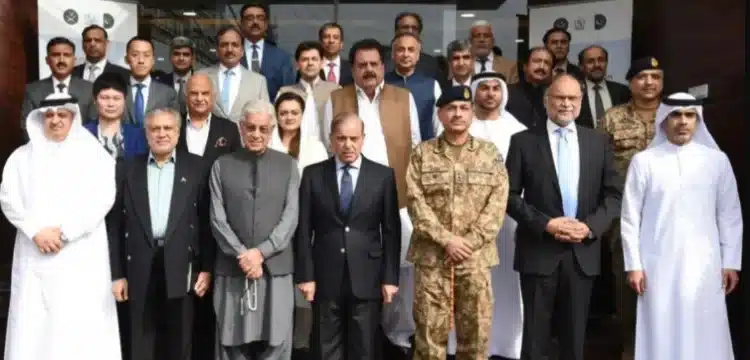[vc_row][vc_column][vc_column_text dp_text_size=”size-4″]On Friday, the country’s civil and military leaders inaugurated the Land Information and Management System – Centre of Excellence (LIMS-COE) to tackle the pressing issues of food insecurity, malnutrition, and rising import costs in the agriculture sector. The groundbreaking solution, initiated by Prime Minister Shehbaz Sharif and Chief of Army Staff (COAS) General Asim Munir, aims to transform unproductive land, ensure food security, boost agricultural exports, and alleviate the burden on the national economy.
The inauguration ceremony was attended by the Prime Minister, COAS, ministers of finance, defence, planning, and information, chief secretaries of provincial governments, agricultural experts, senior army officials, and key officials from other countries.
The establishment of LIMS is a significant initiative to enhance food security, improve agricultural exports, and reduce the import burden on the national exchequer, as stated by the PM Office. The initiative is expected to transform millions of acres of uncultivated or low-yield land within the country.
The state-of-the-art LIMS system will optimize agricultural production through innovative technologies and sustainable precision agricultural practices based on the agroecological potential of the land. It will also prioritize the well-being of rural communities and the preservation of the environment.
Also Read: Senior Journalist Saleem Safi presenting his latest book to PM Shehbaz Sharif
Considering the high levels of food insecurity, malnutrition, and the increasing import bill of agricultural products, the national leadership has taken decisive steps to address these critical issues. The GIS-based LIMS will play a crucial role in improving national agricultural yield by digitizing agriculture, providing real-time information to local farmers about soil, crops, weather, water resources, and pest monitoring through remote sensing and geospatial technologies. Furthermore, it aims to minimize the involvement of middlemen through an efficient marketing system.
These efforts are essential as 36.9% of Pakistanis are food insecure, with 18.3% facing severe food crisis, according to the World Food Programme. The LIMS initiative demonstrates a commitment to address food insecurity, promote agricultural productivity, and ensure a sustainable future for the country.[/vc_column_text][/vc_column][/vc_row]











